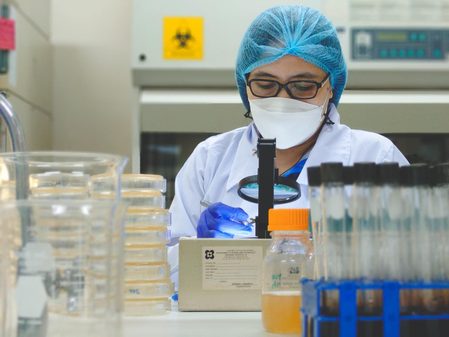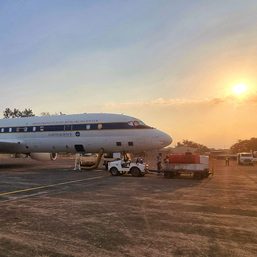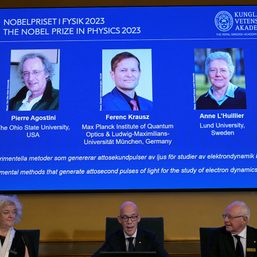SUMMARY
This is AI generated summarization, which may have errors. For context, always refer to the full article.
![[OPINION] Down with paywalls? Opening science to enhance Philippine climate solutions](https://www.rappler.com/tachyon/2023/02/20230223-opening-science-ph-climate-solutions-1.jpg)
A wise woman once said the ultimate purpose of science is in service of the development of society. And certainly enough, most of the things we enjoy today: smartphones, traveling, your favorite meal, the CGI of that third remake of the same superhero movie, and more are made possible through numerous scientific discoveries and innovations.
Yet science as a broad field has had a reputation of being exclusive. Mentioning the word “science” or “math” alone would evoke in many people their difficulties in studying those subjects during their school days.
But the perceived inaccessibility goes beyond that. Let’s use the climate crisis as an example. No problem can be solved without having the proper data and evidence to understand it, and that issue is no exception.
Through the work of experts worldwide for decades, there is now a consensus understanding of the climate crisis being a product of excessive greenhouse gas emissions from burning fossil fuels like coal and gas. There has also been enough progress in identifying the different impacts and solutions that we can see which path to take to address this global threat.
Yet there is so much that we still need to know. In some cases, the research already exists, but it remains inaccessible.
Over 60% of climate-related research articles published in the past decade require paid subscriptions just to be accessed. These studies contain methodologies, outcomes, and other information that may be applicable to addressing similar issues in highly-vulnerable nations like the Philippines, but instead remain locked behind the current boundaries of closed science.
Adding to this problem is the fact that many scientists from developing nations face more institutional challenges than those from high-income countries. These include a lack of access to funding opportunities, perceived prestigious scientific journals, and technologies and equipment, indicators of the reality that persists within the modern scientific community.
This is part of the rationale for the advocacy of open science, or making scientific research more accessible, transparent, and reproducible for the benefit of all sectors of society. It can apply to all stages of the research process, including making produced data more accessible, removing paywalls to published studies, and allowing a more inclusive peer-review process to ensure the research is done properly.
Mainstreaming open science practices is crucial for enhancing the implementation of climate solutions, especially in a country as highly-vulnerable as the Philippines. For example, involving a local community near a forest intended as a study site would likely lead to the integration of local knowledges into the analysis of data and even stronger monitoring process, all of which could result in more robust findings for the study.
Such practices can be observed whenever a typhoon or other kind of climate-related disaster hits the country. Sharing information about the situation in affected communities through traditional or social media (i.e., casualties, environmental damages) allows not only more urgent humanitarian responses, but also scientists to identify research questions for further understanding numerous aspects of a climate change impact at a local setting.
Data availability has always been a problem in the Philippines, especially when it comes to informing policies and solutions at the national and local level. For an issue as critical to our sustainable development as the climate crisis, open science practices could reduce the odds of research findings becoming outdated quickly and make papers more accessible for policymakers to use in their decision-making (assuming they are willing to listen to evidence in the first place).
The truth should be free
Yet it must be recognized that making open science more popular in the Philippine context, including through the lens of climate action, comes with the challenges associated with the science and technology (S&T) industry itself. Some of these issues such as low salaries, heavy workloads, and lack of funding opportunities for conducting research have triggered many of our brilliant minds to leave the country and practice their trades abroad for decades.
Another issue is that scientists themselves do not have as strong of a presence within many science policymaking spaces. There are mechanisms set up for including technical experts in climate-related policymaking in the Philippines, as evidenced by the National Panel of Technical Experts and leading climate scientists being part of the Philippine government delegations to recent global climate negotiations.
Yet these have not always translated to the level of climate action that our country needs, although the bulk of the blame on that would be more on other systemic issues. Nonetheless, scientists must be at the forefront of advocating for popularizing open science in the Philippines.
A stronger presence in the public eye should influence policymakers to pay more attention and allot more resources towards strengthening our S&T sector, which should pave the way for open science practices to be adopted more throughout the country. It would also help in lessening the exclusive reputation of the field in general, which would steer the Philippines closer to its goals related to both climate action and sustainable development.
It must be mentioned that there are pros and cons to open science. While the inclusivity aspect has been highlighted already, it might also place more burden on researchers to pay for their publication fees and lower the overall quality of publications. Yet these can be remedied through developing a set of rules and standards for the protection of all stakeholders involved while still spurring the renaissance of the Philippine S&T sector that is vital for us to survive and thrive in the era of the climate emergency. – Rappler.com
John Leo Algo is the Deputy Executive Director for Programs and Campaigns of Living Laudato Si’ Philippines and a member of Aksyon Klima Pilipinas and the Youth Advisory Group for Environmental and Climate Justice under the UNDP in Asia and the Pacific. He is a climate and environment journalist since 2016.
Add a comment
How does this make you feel?



![[Time Trowel] There is more to archaeology than Indiana Jones’ pistol and whip](https://www.rappler.com/tachyon/2023/12/tl-timetrowel.jpg?resize=257%2C257&crop=245px%2C0px%2C720px%2C720px)

There are no comments yet. Add your comment to start the conversation.